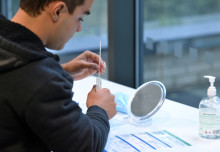

Professors from across the College's faculties receive prestigious Fellowships<em> - News</em>
See also...
External sites:
(Imperial College is not responsible for the content of these external internet sites)
By Danielle Reeves
Friday 18 May 2007
Four Imperial researchers from the Faculties of Natural Sciences, Medicine and Engineering are among 40 distinguished scientists elected to the Fellowship of the Royal Society today.
Professors Peter Barnes and Ravinder Maini from the Faculty of Medicine, Professor Dave Wark from the Faculty of Natural Sciences, and Professor Anthony Kinloch from the Faculty of Engineering, are recognised for their contributions to science and are permitted to place the letters FRS after their names. This brings the number of Royal Society Fellows at Imperial up to 65.
Imperial's Rector, Sir Richard Sykes, congratulated the new Fellows, saying: "I'm delighted that our researchers have been elected to these prestigious fellowships. This is a great year for the College - for four of the Royal Society's new Fellows to be from Imperial is a real coup, and testament to the world-leading research being carried out by our scientists."
Professor Ravinder Maini is a leading biomedical researcher in the Kennedy Institute of Rheumatology, who, together with fellow-Imperial medic Professor Marc Feldman, discovered that cell communication molecules known as cytokines are the key to why arthritis causes the immune system to fight itself. In 1991 Professor Maini and his colleagues discovered that all different kinds of cytokines could be stopped by blocking one kind, called Tumor Necrosis Factor (TNF). This enabled them to develop an anti-TNF treatment which has helped millions of rheumatoid arthritis sufferers around the world.
Commenting on his Fellowship, Professor Maini said: "My contributions to discovering an effective treatment for crippling rheumatoid arthritis have resulted from working for the past two decades with colleagues at the Kennedy Institute, Imperial, and are founded on basic scientific advances. As a clinician-scientist it will be a privilege to join a Fellowship of talented people from all fields of science and draw inspiration for my future work."
Professor Dave Wark is an international authority on neutrino physics and a member of the High Energy Physics group in Imperial's Department of Physics. Neutrinos are elementary particles which travel close to the speed of light, do not have an electrical charge, and are created as a result of certain types of radioactive decay or nuclear reactions. Earlier this year Professor Wark was appointed to the prestigious role of international spokesperson for the 'From Tokai to Kamioka' (T2K) experiment in Japan. This experiment consists of a 'superbeam' of muon-type neutrinos which will be fired along a 295km path, 1km below the ground in Japan. When the superbeam is turned on in 2009, the T2K team hope to record new evidence of the muon-type neutrinos oscillating into electron-type neutrinos and back again – a recently discovered phenomenon.
Professor Peter Dornan FRS, Head of the High Energy Physics group at Imperial, congratulated Professor Wark on his Fellowship, saying: "David is a world expert in neutrino physics. He was persuaded to join Imperial College in 2003 to lead a new initiative examining neutrino oscillations and he has been responsible for establishing the Imperial, then the UK and subsequently the European participation in the world's next major neutrino experiment - the T2K experiment in Japan. His election to the Royal Society is thoroughly justified and deserves our warmest congratulations."
Professor Anthony Kinloch is a world leader in the science and technology of adhesion. His areas of expertise include using fracture mechanics to characterise the toughness of adhesives, analysing the mechanics of peeling, and rubber toughening of thermosetting adhesives. Prior to joining Imperial, Professor Kinloch worked for the British Ministry of Defence, leading a group on advanced materials and energetic materials.
Professor Kinloch said: "I feel very honoured to be elected to a Fellowship of the Royal Society. This is a great personal honour but it could not have happened without the many important contributions from my academic and industrial colleagues, and the efforts of the many research students and post-doctoral researchers that I have had the pleasure to work with over my twenty-some years here at Imperial."
Professor Peter Barnes is a renowned medicine clinician scientist and Professor of Thoracic Medicine at Imperial's National Heart and Lung Institute. Last year he was named a 'Doctor of the Decade' by Science Watch, an international newsletter that tracks performance in science research. He is the thirteenth most cited author in clinical medicine in the world, receiving 16,148 citations by other researchers and authors between 1995 and 2005.
Professor Barnes is a renowned expert on asthma, and was one of the first to recognise the role of chronic inflammation in asthma and the importance of early treatment with inhaled steroids, which has since become standard clinical practice.
On receiving his Fellowship, Professor Barnes said: "I was delighted and surprised to be elected to the Fellowship of the Royal Society. I believe that I am the first respiratory physician to be elected since Henry Hyde Salter, the famous asthma researcher, in 1856."
-Ends-
Article text (excluding photos or graphics) available under an Attribution-NonCommercial-ShareAlike Creative Commons license.
Photos and graphics subject to third party copyright used with permission or © Imperial College London.





